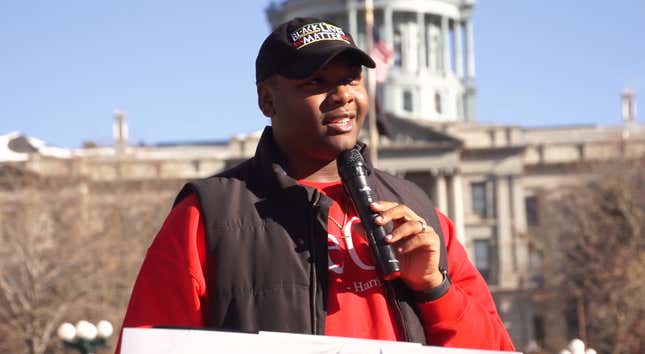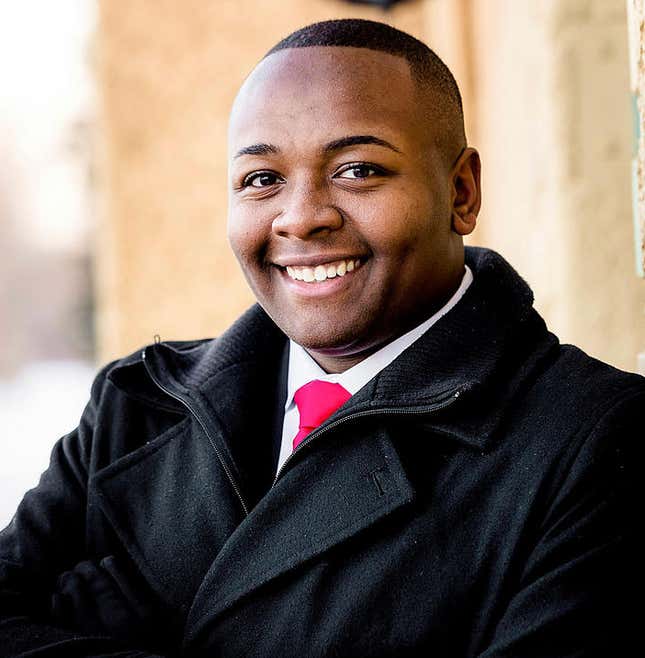
Everything about activist Tay Anderson screams “about that action.”
In 2017, a 19-year-old Anderson spearheaded a 200-person “We Don’t Drink Ink” protest after Colorado-based Ink Coffee boasted “Happily Gentrifying Since 2014" in its promotional materials—which was pretty damn brazen considering the cafe was located in Five Points, one of Denver’s oldest, historically black neighborhoods.
But prior to delivering that encore performance, he challenged incumbent Rachele Espiritu for her District 4 seat on the Denver School Board at only 18-years-old.
“There is just a lack of transparency on the board,” he told the Denver Post at the time. “And a lot of people are not comfortable with that.”
His quest would conclude in defeat, but don’t think that would deter Anderson from pursuing his calling as an educator and community organizer. If anything, it renewed his passion for the people and taught him that setbacks can provide life’s greatest lessons, which he was happy to explore further in speaking with The Root.
“Some of the things we took from that was just how to be able to run a viable campaign,” Anderson said. “Last time we tried to run a social media campaign. This time we’re running a grassroots campaign.”
To that end, he’s sought out an impressive array of over 30 endorsements from State Attorney General Phil Weiser, a handful of state representatives, former Senators, Aurora School Board members and fellow community organizers.
Another focus this time around has been on the necessity of fundraising.
“In Denver, politics is all about money,” he said. “You’re always trying to increase your viability. So we’re leading the pack in fundraising right now. We’ve raised about 15 grand.”
In the past six months, Chalkbeat reports Anderson has reeled in $13,912 from individual donors—a sizable amount compared to teacher Anna DeWitt, his sole opponent for an at-large seat on the Denver Board; she’s raised $5,005. But Anderson insists his campaign will be propelled by far more than just money.
“They say we need to reach $250,000, and our goal is to reach that. But at the end of the day, if we don’t, we’re still gonna run a kick ass campaign with grassroots organizers and people on the ground,” he said. “What our opposition is gonna do with money, we’ll do with people.”
In putting that manpower to proper use, he’s established civil rights as the bedrock of his platform.
“We’re focusing on issues that people don’t talk about or are afraid to talk about,” he said. “Like gender neutral bathrooms and ending ‘Period Poverty.’ There were some young women who came up to me and said they don’t think it’s fair that men can easily ask the school nurse for a condom and the nurse will say, ‘Here, be safe.’ But when women go to the school nurse and ask for a tampon, that’s not always the case. Often they’ll have to pay for tampons in schools.”
This has become a growing concern in schools throughout the country and indicative of not only his ability to lead, but his awareness and sensitivity to issues that exist outside of his own personal experience. But for all his strengths and potential to blossom into a political powerhouse, he’s also keenly aware of his shortcomings—perceived or otherwise.

“People talk about experience,” he said. “It’s ‘you don’t have the policy experience’ or ‘you don’t have the budgetary experience.’ But the people with the experience have the largest achievement gap in the nation. We have black kids that are 7-years-old getting handcuffed and drug through one of our schools. So this leadership we keep leaning on and saying, ‘We need this leadership, we need this expertise’ is obviously failing black students.”
To that point, Anderson is also a strong advocate for restorative justice, which Denver’s North High School has become a national model for practicing. Restorative justice prioritizes repairing harm instead of punishing students and, according to Chalkbeat, has been implemented by more than 40 percent of Denver’s 207 schools. It’s also a contributing factor to a significant drop in school suspensions.
But in discussing his concerns with the contemporary school system, there’s an elephant in the room.
“I don’t believe in making schools prisons,” he said. “I don’t believe in the metal detectors, I don’t believe in arming teachers. I don’t believe the National Guard will make us safer.”
He envisions the provision of mental health resources as a mechanism to combat the rising tide of school shootings.
“I believe what makes a school safe is the community around it. But also having mental health resources available instead of students taking their anger out and hurting people.”
He added, “We don’t even have a mental health counselor at every school. We have cops in every high school, but we don’t have a counselor at every school. But I also plan to work with the state legislature and utilizing my power as a school board member to really let them know that we have to do something about this.”
But in all, Tay just wants voters to see beyond his age and race and instead focus on the value he will bring to his community as a member of Denver’s School Board.
“I’m not asking for your vote because it’s identity politics,” he said. “I’m just saying like we can’t simply operate on a system talking about what’s best for black kids when there isn’t one on the board.”



